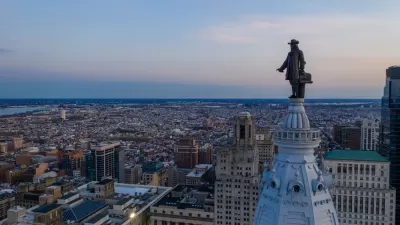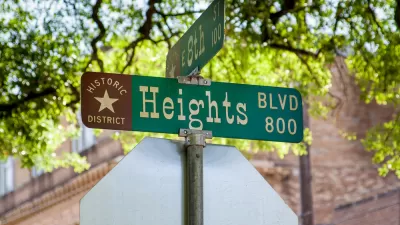A focus on historic materials could foster inequity and obscure the important social and historical meanings of a structure.

In an op-ed in Next City, Bonnie McDonald reevaluates the concept of historic preservation, arguing that “using “integrity,” as defined in regulation, as a gatekeeper to designation and incentives puts too much weight on the materiality of significance.”
McDonald writes, “Our regulations are designed to protect historic material rather than prioritize the needs of people living in and using these places today. We don’t expect people to live and work in museum-like settings, so why mandate that places arrive relatively untouched in order to receive protection?”
For McDonald, “Our field originated to preserve history, heritage, and architecture and has evolved to preserve culture, lifeways, identity, memory and story through place.” McDonald points out that even in a 1966 document, ‘material culture’ was not the focus of historic preservation. “Material changes that happen over time are a part of the story. The presence of changes that reflect a building’s evolution should not prevent its historic designation; in fact, they enrich the building’s story.”
McDonald also points out that “The culture of preciousness also perpetuates a lack of inclusion and equity in preservation,” noting that strict integrity standards can act as a discriminatory barrier for lower-income homeowners. “For property owners that are under-resourced, local designation should be accompanied by more flexible replacement guidelines, free or affordable financing for maintenance and improvements, and accessible information about the permitting process and other resources.”
FULL STORY: To Do Historic Preservation Right, We Need To Move Beyond Our Fixation on Historic Material

Alabama: Trump Terminates Settlements for Black Communities Harmed By Raw Sewage
Trump deemed the landmark civil rights agreement “illegal DEI and environmental justice policy.”

Study: Maui’s Plan to Convert Vacation Rentals to Long-Term Housing Could Cause Nearly $1 Billion Economic Loss
The plan would reduce visitor accommodation by 25% resulting in 1,900 jobs lost.

Planetizen Federal Action Tracker
A weekly monitor of how Trump’s orders and actions are impacting planners and planning in America.

Wind Energy on the Rise Despite Federal Policy Reversal
The Trump administration is revoking federal support for renewable energy, but demand for new projects continues unabated.

Passengers Flock to Caltrain After Electrification
The new electric trains are running faster and more reliably, leading to strong ridership growth on the Bay Area rail system.

Texas Churches Rally Behind ‘Yes in God’s Back Yard’ Legislation
Religious leaders want the state to reduce zoning regulations to streamline leasing church-owned land to housing developers.
Urban Design for Planners 1: Software Tools
This six-course series explores essential urban design concepts using open source software and equips planners with the tools they need to participate fully in the urban design process.
Planning for Universal Design
Learn the tools for implementing Universal Design in planning regulations.
Caltrans
Smith Gee Studio
Institute for Housing and Urban Development Studies (IHS)
City of Grandview
Harvard GSD Executive Education
Toledo-Lucas County Plan Commissions
Salt Lake City
NYU Wagner Graduate School of Public Service





























